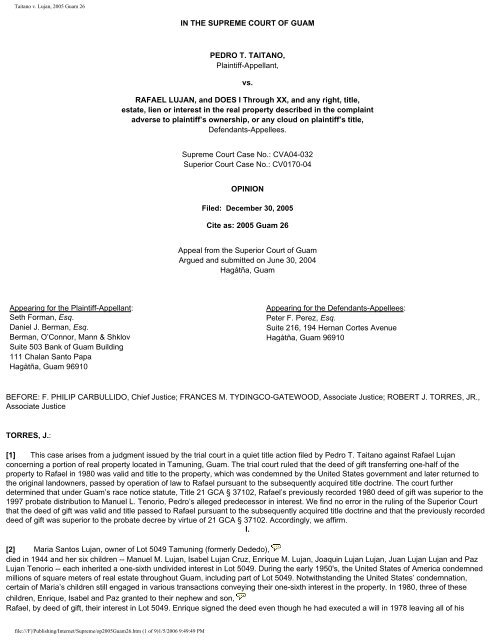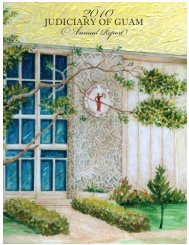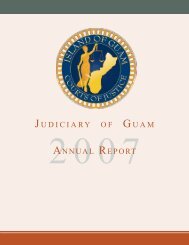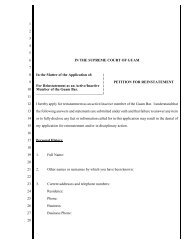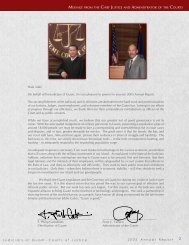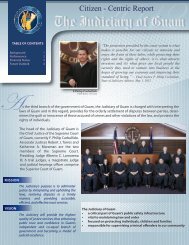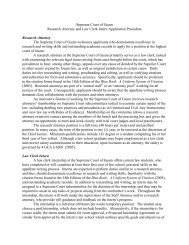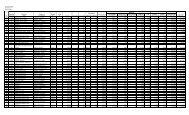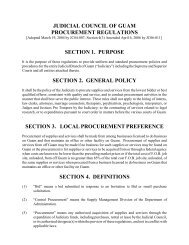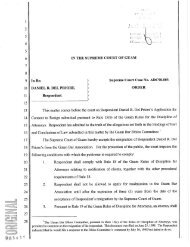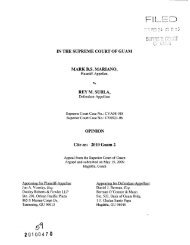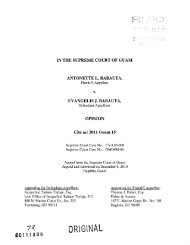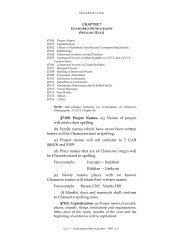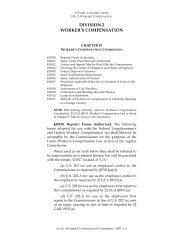Taitano v. Lujan, 2005 Guam 26 - Unified Courts of Guam
Taitano v. Lujan, 2005 Guam 26 - Unified Courts of Guam
Taitano v. Lujan, 2005 Guam 26 - Unified Courts of Guam
Create successful ePaper yourself
Turn your PDF publications into a flip-book with our unique Google optimized e-Paper software.
<strong>Taitano</strong> v. <strong>Lujan</strong>, <strong>2005</strong> <strong>Guam</strong> <strong>26</strong><br />
IN THE SUPREME COURT OF GUAM<br />
PEDRO T. TAITANO,<br />
Plaintiff-Appellant,<br />
vs.<br />
RAFAEL LUJAN, and DOES I Through XX, and any right, title,<br />
estate, lien or interest in the real property described in the complaint<br />
adverse to plaintiff’s ownership, or any cloud on plaintiff’s title,<br />
Defendants-Appellees.<br />
Supreme Court Case No.: CVA04-032<br />
Superior Court Case No.: CV0170-04<br />
OPINION<br />
Filed: December 30, <strong>2005</strong><br />
Cite as: <strong>2005</strong> <strong>Guam</strong> <strong>26</strong><br />
Appeal from the Superior Court <strong>of</strong> <strong>Guam</strong><br />
Argued and submitted on June 30, 2004<br />
Hagåtña, <strong>Guam</strong><br />
Appearing for the Plaintiff-Appellant:<br />
Seth Forman, Esq.<br />
Daniel J. Berman, Esq.<br />
Berman, O’Connor, Mann & Shklov<br />
Suite 503 Bank <strong>of</strong> <strong>Guam</strong> Building<br />
111 Chalan Santo Papa<br />
Hagåtña, <strong>Guam</strong> 96910<br />
Appearing for the Defendants-Appellees:<br />
Peter F. Perez, Esq.<br />
Suite 216, 194 Hernan Cortes Avenue<br />
Hagåtña, <strong>Guam</strong> 96910<br />
BEFORE: F. PHILIP CARBULLIDO, Chief Justice; FRANCES M. TYDINGCO-GATEWOOD, Associate Justice; ROBERT J. TORRES, JR.,<br />
Associate Justice<br />
TORRES, J.:<br />
[1] This case arises from a judgment issued by the trial court in a quiet title action filed by Pedro T. <strong>Taitano</strong> against Rafael <strong>Lujan</strong><br />
concerning a portion <strong>of</strong> real property located in Tamuning, <strong>Guam</strong>. The trial court ruled that the deed <strong>of</strong> gift transferring one-half <strong>of</strong> the<br />
property to Rafael in 1980 was valid and title to the property, which was condemned by the United States government and later returned to<br />
the original landowners, passed by operation <strong>of</strong> law to Rafael pursuant to the subsequently acquired title doctrine. The court further<br />
determined that under <strong>Guam</strong>’s race notice statute, Title 21 GCA § 37102, Rafael’s previously recorded 1980 deed <strong>of</strong> gift was superior to the<br />
1997 probate distribution to Manuel L. Tenorio, Pedro’s alleged predecessor in interest. We find no error in the ruling <strong>of</strong> the Superior Court<br />
that the deed <strong>of</strong> gift was valid and title passed to Rafael pursuant to the subsequently acquired title doctrine and that the previously recorded<br />
deed <strong>of</strong> gift was superior to the probate decree by virtue <strong>of</strong> 21 GCA § 37102. Accordingly, we affirm.<br />
I.<br />
[2] Maria Santos <strong>Lujan</strong>, owner <strong>of</strong> Lot 5049 Tamuning (formerly Dededo),<br />
died in 1944 and her six children -- Manuel M. <strong>Lujan</strong>, Isabel <strong>Lujan</strong> Cruz, Enrique M. <strong>Lujan</strong>, Joaquin <strong>Lujan</strong> <strong>Lujan</strong>, Juan <strong>Lujan</strong> <strong>Lujan</strong> and Paz<br />
<strong>Lujan</strong> Tenorio -- each inherited a one-sixth undivided interest in Lot 5049. During the early 1950's, the United States <strong>of</strong> America condemned<br />
millions <strong>of</strong> square meters <strong>of</strong> real estate throughout <strong>Guam</strong>, including part <strong>of</strong> Lot 5049. Notwithstanding the United States’ condemnation,<br />
certain <strong>of</strong> Maria’s children still engaged in various transactions conveying their one-sixth interest in the property. In 1980, three <strong>of</strong> these<br />
children, Enrique, Isabel and Paz granted to their nephew and son,<br />
Rafael, by deed <strong>of</strong> gift, their interest in Lot 5049. Enrique signed the deed even though he had executed a will in 1978 leaving all <strong>of</strong> his<br />
file:///F|/Publishing/Internet/Supreme/op<strong>2005</strong><strong>Guam</strong><strong>26</strong>.htm (1 <strong>of</strong> 9)1/5/2006 9:49:49 PM
<strong>Taitano</strong> v. <strong>Lujan</strong>, <strong>2005</strong> <strong>Guam</strong> <strong>26</strong><br />
estate to another nephew, Manuel, also Paz’s son.<br />
[3] Enrique died in 1990 and the 1978 will was probated in Superior Court Probate Case No. PR 0124-92. Letters testamentary were<br />
issued to Manuel who listed Lot 5049 as an asset <strong>of</strong> the estate. Notice <strong>of</strong> the petition for the probate <strong>of</strong> the will was given to the widows or<br />
children <strong>of</strong> Enrique’s siblings (Manuel, Isabel, Joaquin, and Juan) who had predeceased Enrique. Paz, the only surviving sibling <strong>of</strong> Enrique,<br />
also received notice <strong>of</strong> the petition, but her son Rafael, grantee under the deed <strong>of</strong> gift, did not receive any notice <strong>of</strong> the petition.<br />
[4] In 1994, the United States Congress passed the <strong>Guam</strong> Excess Lands Act, Public Law No. 103-339, 108 Stat. 3116 (1994), requiring<br />
identification and valuation <strong>of</strong> lands that had been condemned under eminent domain on <strong>Guam</strong>, but which were no longer needed for the<br />
purposes for which they were condemned. After identifying and valuing those lands, the Administrator <strong>of</strong> General Services was to “transfer<br />
all right, title and interest <strong>of</strong> the United States in and to the parcels <strong>of</strong> land . . . to the Government <strong>of</strong> <strong>Guam</strong> for public benefit use, by quitclaim<br />
deed.” <strong>Guam</strong> Excess Lands Act §2 (a).<br />
[5] In anticipation <strong>of</strong> the return <strong>of</strong> these excess lands, the <strong>Guam</strong> Legislature enacted several laws, among them An Act to Develop Land-<br />
Use Policy and Plans for Certain Parcels <strong>of</strong> Land Belonging to the Government <strong>of</strong> <strong>Guam</strong>, <strong>Guam</strong> Public Law 22-145, whereunder the<br />
Legislature first expressed its intent to convey all returned land to the original landowners by directing the Director <strong>of</strong> Land Management to<br />
transfer to the original landowners and their heirs any land that is acquired by the government by the <strong>Guam</strong> Excess Lands Act. The<br />
Legislature again voiced its intent to return the land to the original landowners when it later passed An Act to Create the <strong>Guam</strong> Land<br />
Repatriation Commission, <strong>Guam</strong> Public Law 23-23; An Act to Provide an Environmental Clearinghouse for the Review <strong>of</strong> Federal Real<br />
Property Transfers, <strong>Guam</strong> Public Law 23-101; and An Act to Develop Land-Use Policy and Plans for Certain Parcels <strong>of</strong> Excess Federal<br />
Properties, <strong>Guam</strong> Public Law 23-141.<br />
[6] Manuel filed a Claim <strong>of</strong> Interest, for himself and his heirs, with the Office <strong>of</strong> the Recorder, Department <strong>of</strong> Land Management in<br />
February 1995, as the “Administrator” <strong>of</strong> the Estate <strong>of</strong> Enrique. In the Claim <strong>of</strong> Interest, he purportedly gave public notice <strong>of</strong> their legal claim<br />
and title to Lot 5049 and requested the lot be returned to Enrique’s Estate. In 1997, the Superior Court <strong>of</strong> <strong>Guam</strong> entered a Decree <strong>of</strong> Final<br />
Distribution in Enrique’s probate case distributing all <strong>of</strong> Enrique’s property, including Lot 5049, to Manuel. Manuel later sought assurances<br />
from the Government <strong>of</strong> <strong>Guam</strong> that the property would be returned to the original landowners, and as part <strong>of</strong> the process <strong>of</strong> the return <strong>of</strong><br />
excess lands from the United States, Manuel, as grantee and the Department <strong>of</strong> Land Management, Government <strong>of</strong> <strong>Guam</strong> as grantor,<br />
executed a Grant <strong>of</strong> Contingent Future Interest granting an undivided one-sixth contingent future interest in Lot 5049 to the six children <strong>of</strong><br />
Maria (five <strong>of</strong> whom had died by 1998).<br />
[7] On November 14, 2001, Manuel granted a durable limited power <strong>of</strong> attorney to Pedro to “maintain, oversea (sic), execute all<br />
transactions concerning Lot 5049.” Appellant’s Excerpts <strong>of</strong> Record (“ER”), p. 15 (Petition to Quiet Title). The same day, Manuel also<br />
executed a Bill <strong>of</strong> Sale which transferred to Pedro the “house and everything contained therein located at 1368 N. Marine Drive Tamuning<br />
<strong>Guam</strong> <strong>of</strong> Lot 5049.” ER p. 35 (Notice <strong>of</strong> Mot. and Mot. to Dismiss or in the Alt. for Summ. J., Ex. A, Bill <strong>of</strong> Sale). The Bill <strong>of</strong> Sale further<br />
provided that Manuel agreed to “negotiate sale <strong>of</strong> property where house is located at a later time.” Appellant’s Excerpts <strong>of</strong> Record (“ER”), p.<br />
35 (Notice <strong>of</strong> Mot. and Mot. to Dismiss or in the Alt. for Summ. J., Ex. A, Bill <strong>of</strong> Sale). The power <strong>of</strong> attorney was not recorded with the Office<br />
<strong>of</strong> the Recorder until March 2002, and two days later Pedro, as attorney in fact for Manuel, quitclaimed Lot 5049 to his son Richard Steuart<br />
<strong>Taitano</strong>. Shortly thereafter Manuel revoked the power <strong>of</strong> attorney given to Pedro.<br />
[8] The title for Lot 5049 finally passed from the U.S. to the Government <strong>of</strong> <strong>Guam</strong> in October 2002 by a quitclaim deed, and from the<br />
Government <strong>of</strong> <strong>Guam</strong> to the <strong>Guam</strong> Ancestral Lands Commission in November 2002. Appellant’s ER, p.50 Exhibit C. The <strong>Guam</strong> Ancestral<br />
Lands Commission then transferred Lot 5049 to the heirs <strong>of</strong> Maria by quitclaim deed in June 2003. Appellant’s ER p. 51, Exhibit C.<br />
[9] Pedro filed the quiet title action against Rafael in February 2004, claiming he was the owner in fee simple <strong>of</strong> Lot 5049, being a bona<br />
fide third party purchaser <strong>of</strong> the property after it was returned to the heirs <strong>of</strong> Maria. Rafael responded with a Motion to Dismiss or in the<br />
Alternative for Summary Judgment, arguing that Pedro’s petition failed to state a claim upon which relief could be granted under <strong>Guam</strong> Rule<br />
<strong>of</strong> Civil Procedure 12(b)(6) and/or that summary judgment was appropriate on the basis that the 1980 deed <strong>of</strong> gift to Rafael was recorded<br />
prior to any conveyance to Manuel and therefore superior under <strong>Guam</strong>’s race notice statute, Title 21 GCA § 37102. Pedro opposed,<br />
asserting that the 1997 decree <strong>of</strong> final distribution in Enrique’s estate should be given effect over the 1980 deed <strong>of</strong> gift, since at the time <strong>of</strong><br />
the gift, Enrique and his siblings did not own the property. Rather the property was owned by the United States until it was returned to the<br />
Government <strong>of</strong> <strong>Guam</strong> in 2002.<br />
[10] After a hearing, the Superior Court <strong>of</strong> <strong>Guam</strong> ruled that Enrique, Isabel and Paz could transfer their ownership interest in Lot 5049 by<br />
way <strong>of</strong> the 1980 deed <strong>of</strong> gift even though they did not possess any present interest in Lot 5049 but only possessed a future contingent<br />
interest. The court further determined the probate distribution to Manuel in 1997 was precluded by the doctrine <strong>of</strong> subsequently acquired title<br />
because the property had already been conveyed to Rafael in 1980. Finally the court held, since the deed <strong>of</strong> gift was recorded with the<br />
Office <strong>of</strong> the Recorder before the decree <strong>of</strong> final distribution, the deed <strong>of</strong> gift was superior under <strong>Guam</strong>’s race notice statute, 21 GCA<br />
§37102. The trial court granted summary judgment in favor <strong>of</strong> Rafael and vacated the lis pendens which had been filed by Pedro with the<br />
Office <strong>of</strong> the Recorder. A judgment decreeing that Pedro had no interest to Lot 5049 was entered and Pedro appealed.<br />
II.<br />
file:///F|/Publishing/Internet/Supreme/op<strong>2005</strong><strong>Guam</strong><strong>26</strong>.htm (2 <strong>of</strong> 9)1/5/2006 9:49:49 PM
<strong>Taitano</strong> v. <strong>Lujan</strong>, <strong>2005</strong> <strong>Guam</strong> <strong>26</strong><br />
[11] This court has jurisdiction over this appeal from a final judgment pursuant to 48 U.S.C. § 1424-1(a)(2) (Westlaw through Pub. L. 109-<br />
20 (<strong>2005</strong>)), and Title 7 GCA §§ 3107(b) and 3108(b) (<strong>2005</strong>). A trial court’s decision granting a motion for summary judgment in a quiet title<br />
action is reviewed de novo. Paulino v. Biscoe, 2000 <strong>Guam</strong> 13 12. In rendering a decision on a motion for summary judgment, the court<br />
must draw the evidence in a light most favorable to the non-moving party. Bank <strong>of</strong> <strong>Guam</strong> v. Flores, 2004 <strong>Guam</strong> 25 7; Taijeron v. Kim, 1999<br />
<strong>Guam</strong> 16 8.<br />
[12] Pedro argues on appeal that the trial court erroneously concluded that the 1980 deed <strong>of</strong> gift was a valid transfer <strong>of</strong> a future interest<br />
pursuant to Title 21 GCA §§12<strong>26</strong>, 1228 and 1230. The mere possibility <strong>of</strong> the return <strong>of</strong> property condemned by the United States to its<br />
original owners is, Pedro contends, so remote as to be an expectancy and not an interest <strong>of</strong> any kind. Moreover, the doctrine <strong>of</strong><br />
subsequently acquired title should not have applied in this case because the deed <strong>of</strong> gift was not a warranty deed conveying a fee simple<br />
interest.<br />
III.<br />
[13] Rafael maintains that the trial court properly granted summary judgment because, under <strong>Guam</strong> law, the deed <strong>of</strong> gift was a valid future<br />
interest transfer, and superior to any subsequent inconsistent transfers. Even if the grantors did not have title in 1980, Rafael insists that<br />
Pedro should be estopped from opposing Rafael’s interest under the doctrine <strong>of</strong> subsequently acquired title which is not limited to<br />
conveyances involving warranty deeds. Rafael also contends that the appeal should be dismissed. Rafael’s arguments that the appeal<br />
should be dismissed are essentially two-fold. First, he maintains Pedro has no interest in Lot 5049 and lacks standing to bring the appeal<br />
because the Bill <strong>of</strong> Sale did not convey any property to Pedro and any alleged interest that Manuel had was instead conveyed by quitclaim<br />
deed to Pedro’s son Richard and also because Pedro did not make the appropriate jurisdictional allegations that the trial court had subject<br />
matter jurisdiction or personal jurisdiction over the parties. Second, Rafael alleges that the appeal should be dismissed as moot because<br />
Rafael’s interest had already been conveyed to Fuji <strong>Guam</strong> Corporation, a bona fide third party purchaser which later conveyed its interest to<br />
yet another bona fide third party purchaser, Chris Felix. Consequently Rafael argues this court cannot grant any effectual relief in favor <strong>of</strong><br />
Pedro.<br />
[14] We first consider whether the appeal should be dismissed because it is moot or because Pedro lacks standing to pursue his claims.<br />
A. Standing and Mootness<br />
1. Pedro’s standing to appeal<br />
[15] Rafael’s arguments on standing and mootness are raised for the first time on appeal. Normally, this court will not entertain new<br />
arguments on appeal, Taniguchi-Ruth & Assocs. v. MDI <strong>Guam</strong> Corp., <strong>2005</strong> <strong>Guam</strong> 7 82 (“Our exercise <strong>of</strong> discretion to review an issue<br />
raised for the first time on appeal is reserved for extraordinary circumstances where review is necessary to address a miscarriage <strong>of</strong> justice<br />
or clarify significant issues <strong>of</strong> law.”) Standing is, however, a component <strong>of</strong> subject matter jurisdiction. See <strong>Guam</strong> Imaging Consultants, Inc. v.<br />
<strong>Guam</strong> Mem’l Hosp. Auth., 2004 <strong>Guam</strong> 15 17 (“Standing is a threshold jurisdictional matter.”). If a party does not have standing to bring a<br />
claim, a court has no subject matter jurisdiction to hear the claim. Id. Accordingly, it “may be raised at any stage <strong>of</strong> the proceedings,<br />
including for the first time on appeal.” A-Z Intern. v. Phillips, 179 F.3d 1187, 1190-91 (9th Cir. 1999) (citation omitted). The question <strong>of</strong><br />
standing to sue goes to the existence <strong>of</strong> a cause <strong>of</strong> action against the defendant. Parker v. Bowron, 254 P.2d 6, 9 (Cal. 1953); Common<br />
Cause v. Bd. <strong>of</strong> Supervisors, 777 P.2d 610, 613-14 (Cal. 1989). Our review <strong>of</strong> whether a party has standing is de novo. Rivas v. Rail<br />
Delivery Serv., Inc., 423 F.3d 1079, 1082 (9th Cir. <strong>2005</strong>).<br />
[16] The argument that Pedro lacks standing stems from the language in the Bill <strong>of</strong> Sale from Manuel to Pedro and Pedro’s quitclaim as<br />
attorney-in-fact for Manuel to his son Richard. Rafael advances that the Bill <strong>of</strong> Sale did not convey any real property interest to Pedro and<br />
the quitclaim to Richard on behalf <strong>of</strong> Manuel means Richard, not Pedro, is the proper party to bring the quiet title action. The Bill <strong>of</strong> Sale<br />
states that Manuel is transferring the “following described chattels and personal property: The house and everything contained therein<br />
located at 1368 N. Marine Drive, Tamuning, <strong>Guam</strong> <strong>of</strong> Lot 5049. . .”. Appellant’s ER p. 35, Ex.A, Defendant’s Mot. to Dismiss or in the Alt. for<br />
Summ. J. The Bill <strong>of</strong> Sale further provides that “Seller agrees to negotiate sale <strong>of</strong> property where house is located at a later time however<br />
first option goes to the buyer <strong>of</strong> said house.” Appellant’s ER p. 35.<br />
[17] Pedro argues that the language <strong>of</strong> the Bill <strong>of</strong> Sale itself seems unclear whether Pedro was being granted an interest in the land where<br />
the house was located or just the house without any interest in the land. He asserts that the court has the equitable power to determine his<br />
and Manuel’s rights in the property and to give effect to their intentions and summary judgment was not appropriate.<br />
[18] “In rendering a decision on a motion for summary judgment, the court must draw inferences and view the evidence in a light most<br />
favorable to the non-moving party.” Flores, 2004 <strong>Guam</strong> 25 7. The viewpoint most favorable to Pedro would be that the Bill <strong>of</strong> Sale in<br />
question did indeed convey some cognizable interest in the property to Pedro prior to the quitclaim to his son, Richard.<br />
[19] Manuel’s subsequent quitclaim <strong>of</strong> the property to Richard would, therefore, not include any real property interest that Manuel may<br />
have earlier conveyed to Pedro. “A quitclaim deed only transfers whatever interest the grantor had in the described property at the time the<br />
conveyance was made.” In re Marriage <strong>of</strong> Gioia, 14 Cal. Rptr. 3d 362, 368 (Ct. App. 2004). Moreover, even if Pedro was not conveyed any<br />
title to the real property by virtue <strong>of</strong> the Bill <strong>of</strong> Sale, he was given a “first option” on the property. The grant <strong>of</strong> the “option” on Lot 5049 alone<br />
file:///F|/Publishing/Internet/Supreme/op<strong>2005</strong><strong>Guam</strong><strong>26</strong>.htm (3 <strong>of</strong> 9)1/5/2006 9:49:49 PM
<strong>Taitano</strong> v. <strong>Lujan</strong>, <strong>2005</strong> <strong>Guam</strong> <strong>26</strong><br />
appears sufficient to give Pedro standing to bring a claim. This court need not decide at this juncture the nature or efficacy <strong>of</strong> the<br />
conveyances between Manuel, Pedro and Richard in 2001 to 2002. We only need to decide if Pedro has standing. When viewed in a light<br />
most favorable to the non-moving party, the record supports that Pedro had some cognizable interest in the land, and therefore we must<br />
conclude that Pedro has standing sufficient to overcome Rafael’s objection on this ground.<br />
[20] Rafael also claims that Pedro does not have standing because he did not make a correct jurisdictional allegation in his pleadings that<br />
the trial court had jurisdiction over the parties or the subject matter. Although Rafael complains <strong>of</strong> the missing jurisdictional allegation, Rafael<br />
simultaneously defends the trial court’s decision, which is in his favor. Interestingly, Rafael complains only that allegations <strong>of</strong> the complaint<br />
are insufficient to confer upon the court subject matter jurisdiction or jurisdiction over the parties and not that the court did not actually have<br />
subject matter jurisdiction or jurisdiction over the parties. Again, Rafael did not raise these arguments below.<br />
[21] Pedro points out that Rafael’s delay in raising this issue and his failure to identify it in prior pleadings should bar him from raising it at<br />
this late stage <strong>of</strong> the litigation. A court’s lack <strong>of</strong> subject matter jurisdiction over an action may, however, be raised at any time, including after<br />
trial has concluded and for the first time on appeal, and may not be waived or excused by the parties. Jenkins v. Keller, 216 N.E.2d 379, 382<br />
(Ohio 1966), Davis v. Dep’t <strong>of</strong> Corr., 651 N.W.2d 486, 488 (Mich. Ct. App. 2002); see also State ex rel. Skinkis v. Treffert, 280 N.W.2d 316,<br />
319 (Wisc. Ct. App. 1979).<br />
[22] In determining if the court has subject matter jurisdiction we follow the widely accepted principle that a complaint is construed broadly<br />
and liberally, in conformity with the general principle set forth in Rule 8 <strong>of</strong> the <strong>Guam</strong> Rules <strong>of</strong> Civil Procedure. Huettig & Schromm, Inc. v.<br />
Landscape Contractors Council, 790 F.2d 1421, 14<strong>26</strong> (9th Cir. 1986). It has been well-established by case law that the pleadings will be<br />
read as a whole with any relevant specific allegations found in the body <strong>of</strong> the complaint taking precedence over the formal jurisdictional<br />
allegation, and with all uncontroverted factual allegations in the complaint being accepted as true. See Steel Co. v. Citizens for a Better<br />
Env’t, 523 U.S. 83 (1998); Mendoza v. Zirkle Fruit Co., 301 F.3d 1163 (9th Cir. 2002).<br />
[23] The petition in this case is to quiet title to real property located in Tamuning <strong>Guam</strong>, a matter the trial court obviously has jurisdiction<br />
over pursuant to Title 21 GCA § 25101 and 7 GCA § 3105 (<strong>2005</strong>). The allegations set forth in the petition are sufficient to confer jurisdiction<br />
and need not be pleaded specifically. Rafael himself indicates this case as a “quiet title” action, over which the Superior Court has<br />
jurisdiction pursuant to Title 21 GCA § 25101. Rafael states in his Motion to Dismiss or in the Alternative for Summary Judgment that he<br />
seeks to dismiss the Petition to Quiet Title to Lot 5049. Appellee’s ER p. <strong>26</strong>, Mot. to Dis. or in the Alt. for Summ. J. A liberal reading <strong>of</strong> the<br />
complaint and the record makes clear that the trial court had subject matter jurisdiction in this case.<br />
[24] As to Rafael’s right to object to a lack <strong>of</strong> personal jurisdiction, generally this is an affirmative defense that is waived by a failure to<br />
raise it promptly either by pre-answer motion or in the response pleading <strong>Guam</strong> R. Civ. P. 12(h)(1). Long-Term Credit Bank v. Superior<br />
Court, 2003 <strong>Guam</strong> 10 43 (jurisdictional objections such as defects in personal jurisdiction, venue or service <strong>of</strong> process, are waived unless<br />
asserted early in the litigation.). “There is no dispute that normally a failure to timely raise the defense <strong>of</strong> personal jurisdiction waives the<br />
defense[,]”yet a court may “retain discretion to reach an issue initially raised on appeal in certain situations.” Giotis v. Apollo <strong>of</strong> the Ozarks,<br />
Inc., 800 F.2d 660, 663 (7th Cir. 1986)<br />
[25] We hold that Rafael’s failure to promptly raise the issue <strong>of</strong> personal jurisdiction, the participation <strong>of</strong> Rafael in the lawsuit, his<br />
submission to the ultimate judgment <strong>of</strong> the court, and his defense in this appeal <strong>of</strong> that judgment, constitutes a waiver <strong>of</strong> the affirmative<br />
defense <strong>of</strong> personal jurisdiction. There is no impediment to Pedro’s standing to bring a quiet title action or this appeal.<br />
2. Whether Fuji or Felix is a Bona Fide Purchaser Remains in Dispute<br />
[<strong>26</strong>] Rafael further argues for the first time on appeal that his conveyance to Fuji has made the action moot because Fuji is a bona fide<br />
third party purchaser and transfer to a bona fide third party purchaser cuts <strong>of</strong>f prior disputes. Moreover, when the court vacated the lis<br />
pendens in its Decision and Order, no new lis pendens was filed. Meanwhile, the deed transferring title to Fuji was recorded and Fuji entered<br />
into an agreement to convey its interests to another third party, Felix, who Rafael argues is also a bona fide purchaser. Pedro, in reply,<br />
insists the action has not been mooted because the transfer to Fuji by quitclaim deed did not occur until January <strong>2005</strong><br />
and Fuji was aware <strong>of</strong> the litigation. Therefore, Fuji is not a bona fide third party purchaser. In addition, Pelowski v. <strong>Taitano</strong>, 2000 <strong>Guam</strong> 34<br />
22-25, holds that constructive notice <strong>of</strong> the pendency <strong>of</strong> the action continues during the time an appeal is taken. The initial lis pendens<br />
effectively imparts constructive notice <strong>of</strong> the pending action to Fuji and Felix before legal title was transferred, therefore preventing either <strong>of</strong><br />
them from being a bona fide third party purchaser.<br />
[27] Under the bona fide purchaser doctrine, a good faith real estate purchaser for value who is without actual or constructive notice <strong>of</strong><br />
another’s interest in the property purchased has the superior interest in the property. Title 21 GCA § 37102 (<strong>2005</strong>). See Morioka v. I & F<br />
Corp., Civ. No. 91-00027A, 1991 WL 255842 at *3 (D. <strong>Guam</strong> App. Div. Nov. 18, 1991) (“To become a bona fide purchaser <strong>of</strong> property one<br />
must acquire title through payment <strong>of</strong> value, in good faith, and without actual or constructive notice <strong>of</strong> another’s rights.”). If Fuji or its<br />
successor Felix is a bona fide purchaser, then their right to the land prevails over other claimants, and the case becomes moot. An appellate<br />
court lacks jurisdiction to resolve issues that have become moot by intervening events. “The case must be viable at all stages <strong>of</strong> the<br />
litigation; it is not sufficient that the controversy was live only at its inception.” C & C Products, Inc. v. Messick, 700 F.2d 635, 636 (11th Cir.<br />
1983). The fact that the mooting event occurred after the decision below “does not save the . . . claims from mootness. There must be a live<br />
file:///F|/Publishing/Internet/Supreme/op<strong>2005</strong><strong>Guam</strong><strong>26</strong>.htm (4 <strong>of</strong> 9)1/5/2006 9:49:49 PM
<strong>Taitano</strong> v. <strong>Lujan</strong>, <strong>2005</strong> <strong>Guam</strong> <strong>26</strong><br />
case or controversy before this Court.” Kremens v. Bartley, 431 U.S. 119, 128 (1977); see also Silver v. Benson, 177 A.2d. 898, 901 (Md.<br />
1962) (recognizing that “cases where appeals were dismissed as moot are generally where relief has become impossible, as where the<br />
property in question has been sold to a bona-fide purchaser . . . .”).<br />
[28] Rafael’s argument that Fuji and Felix qualify as bona fide purchasers simply because no new lis pendens was filed after the trial court<br />
vacated the original lis pendens and legal title was thereafter transferred is unpersuasive and has no basis in <strong>Guam</strong> law. Although a notice <strong>of</strong><br />
lis pendens filed under Title 7 GCA §14103 cannot be relied upon to afford constructive notice when the underlying action is terminated, in<br />
Pelowski, 2000 <strong>Guam</strong> 34 25, we interpreted section 14103 “to impart constructive notice through the period for which an appeal may be<br />
taken or the time for appeal has passed.” As we stated in Pelowski:<br />
The policy underlying the lis pendens doctrine is the need, in the interest <strong>of</strong> the proper administration <strong>of</strong> justice, “to keep the<br />
subject-matter <strong>of</strong> the litigation within the control <strong>of</strong> the court, and to render the parties powerless to place it beyond the reach <strong>of</strong><br />
the final judgment.” Roberts v. Cardwell, 154 Ky. 483, 157 S.W. 711, 713 (Ky.1913); see also Ashworth, 408 S.W.2d at 873.<br />
Where the ownership <strong>of</strong> property remains subject to further litigation it is incumbent to “preserve the property [so] that the [very]<br />
purpose <strong>of</strong> the pending suit may not be defeated by successive alienations and transfers <strong>of</strong> title.” Ashworth, 408 S.W.2d at 873<br />
(internal quotations omitted) (citation omitted). A litigant should be forbidden from “giv[ing] rights to others, [while the opportunity<br />
for further review remains], so as to affect the proceedings <strong>of</strong> the court then progressing to enforce those rights.” Id. (internal<br />
quotations omitted) (citation omitted).<br />
Id. 24. Constructive notice to Fuji and Felix continues during the appeal even though the lis pendens was vacated by the trial court.<br />
[29] The fact that Fuji received legal title in January <strong>2005</strong> with constructive notice <strong>of</strong> the pendency <strong>of</strong> the action in CV0170-04 does not,<br />
however, completely answer the question <strong>of</strong> whether or not Fuji or Felix qualifies as a bona fide purchaser. In Morioka, the trial court, in<br />
construing Title 21 GCA § 37102, rejected the pre-1953 California cases that “held that in order to be accorded bona fide purchaser status, a<br />
purchaser must prove that he paid the full purchase price before receiving actual or constructive notice.” Morioka, 1991 WL 255842 at *3.<br />
Instead the court held that an uncompleted land sales contract does not preclude a purchaser from becoming a bona fide purchaser for<br />
value. Id. (relying on Perry v. O’Donnell, 749 F.2d 1346 (9th Cir. 1985).<br />
[30] Fuji entered into its Memorandum <strong>of</strong> Purchase and Sale in August 2002 and acquired legal title in <strong>2005</strong>, while Felix entered into its<br />
contract <strong>of</strong> sale in January 2004.<br />
Fuji and Felix’s constructive notice <strong>of</strong> the pending action before they acquired full legal title does not prevent them from enjoying the status <strong>of</strong><br />
bona-fide purchases. Both had an equitable interest in the property before the commencement <strong>of</strong> the litigation and recording <strong>of</strong> the lis<br />
pendens. “[T]he equitable nature <strong>of</strong> their interest does not automatically preclude them from becoming bona fide purchasers.” O’Donnell, 749<br />
F.2d at 1350. A purchaser who holds an equitable interest leaving legal title in the vendor may be a bona fide purchaser for value.<br />
[31] While the equitable nature <strong>of</strong> their interest does not prevent them from bona fide purchaser status, Fuji and Felix would still not be<br />
bona fide purchasers if they acquired their equitable interest with notice <strong>of</strong> the prior interest claimed by Manuel, Pedro’s’ predecessor in<br />
interest. It is undisputed that a “Claim <strong>of</strong> Interest” was completed with the Office <strong>of</strong> the Recorder in February 16, 1995 wherein Manuel<br />
purportedly gave public notice <strong>of</strong> the Estate <strong>of</strong> Enrique’s legal claim and title to Lot 5049 and requested the lot be returned to Enrique’s<br />
Estate. Appellant’s ER, p. 5 (Claim <strong>of</strong> Interest, Feb. 16, 1995). This document was recorded nearly seven years before Rafael entered into<br />
the contract with Fuji to sell the property.<br />
An examination <strong>of</strong> the record discloses that the trial court did not make a finding on whether Fuji or Felix was a bona fide purchaser without<br />
notice <strong>of</strong> the “Claim <strong>of</strong> Interest.” The burden <strong>of</strong> pro<strong>of</strong> is upon Rafael to establish Fuji’s and Felix’s status as bona fide purchasers without<br />
notice <strong>of</strong> any adversarial claims to the property. See Gates Rubber Co. v. Ulman, <strong>26</strong>2 Cal. Rptr. 630, 637 n.6 (Ct. App. 1989); Rabbit v.<br />
Atkinson, 113 P.2d 14, 18 (Cal. Ct. App. 1941); James v. James, 251 P. 666, 670 (Cal. Ct. App. 19<strong>26</strong>). A representative <strong>of</strong> Fuji or Felix did not file<br />
any affidavits setting forth that Fuji or Felix did not have notice or knowledge <strong>of</strong> any competing claims to the property, before the purchase and<br />
sale agreements were signed. See Rabbit, 113 P.2d at18. (stating that “[n]either the appellant nor his grantor took the witness stand to testify as<br />
to whether or not they had notice or knowledge <strong>of</strong> respondents' rights or claims or that appellant was a purchaser in good faith, without notice,<br />
and for a valuable consideration”).<br />
[32] We cannot determine from the record as it exists if the property has been sold to a bona fide purchaser case thereby rendering the case<br />
moot. There is a genuine issue <strong>of</strong> fact regarding whether Fuji or Felix had notice <strong>of</strong> a competing claim or opposing interest in the property which<br />
presents them from being a bona fide purchaser. However, “[t]he mere existence <strong>of</strong> some alleged factual dispute between the parties will not<br />
defeat an otherwise properly supported motion for summary judgment; the requirement is that there be no genuine issue <strong>of</strong> material fact.” Bank <strong>of</strong><br />
<strong>Guam</strong>, 2004 <strong>Guam</strong> 25 30 (quoting Anderson v. Liberty Lobby, Inc., 477 U.S. 242, 247-48 (1986)). “Only disputes over facts that might affect the<br />
outcome <strong>of</strong> the suit under the governing law will properly preclude the entry <strong>of</strong> summary judgment. Factual disputes that are irrelevant or<br />
unnecessary will not be counted.” Id. (quoting Anderson v. Liberty Lobby, Inc., 477 U.S. 242, 247-48 (1986)). If we determine Enrique validly<br />
gifted his interest in Lot 5049 to Rafael, then deciding whether Fuji Corporation or its successor, Felix, is a bona fide purchaser is immaterial as<br />
they would nevertheless receive title from a prevailing party. If Enrique could not, however, transfer his interest in Lot 5049, by a deed <strong>of</strong> gift, then<br />
there may be a genuine issue <strong>of</strong> material fact which would preclude summary judgment. Id. 29.<br />
[33] In resolving whether summary judgment was appropriate, the starting point <strong>of</strong> our analysis must be whether the deed <strong>of</strong> gift transferring onehalf<br />
(½) <strong>of</strong> the property to Rafael in 1980 was a valid conveyance.<br />
file:///F|/Publishing/Internet/Supreme/op<strong>2005</strong><strong>Guam</strong><strong>26</strong>.htm (5 <strong>of</strong> 9)1/5/2006 9:49:49 PM
<strong>Taitano</strong> v. <strong>Lujan</strong>, <strong>2005</strong> <strong>Guam</strong> <strong>26</strong><br />
B. Validity <strong>of</strong> the 1980 Deed <strong>of</strong> Gift<br />
[34] Pedro initially argues that Enrique did not have any sort <strong>of</strong> recognizable future interest that could be transferred to Rafael at the time <strong>of</strong> the<br />
1980 deed <strong>of</strong> gift. In 1980 the property was still owned by the United States and Enrique’s chances <strong>of</strong> recovering the property was dependent on<br />
the United States’ return <strong>of</strong> the property which, according to Pedro was, a mere possibility and too remote to qualify as a future interest. Under<br />
Title 21 GCA § 1231 (<strong>2005</strong>), “a mere possibility, such as the expectancy <strong>of</strong> an heir apparent, is not to be deemed an interest <strong>of</strong> any kind.” Rafael<br />
counters this by stating that although the property was owned by the United States at the time <strong>of</strong> the deed’s execution, the original landowners<br />
possessed a future interest in the property which they were free to convey to Rafael.<br />
[35] The statutory scheme on future interests is found in Title 21 GCA Division 1, Subpart B. A future interest entitles “the owner to the<br />
possession <strong>of</strong> the property only at a future period.” Title 21 GCA § 1221 (<strong>2005</strong>). The “Kinds <strong>of</strong> Future Interests,” are either vested or contingent.<br />
Title 21 GCA § 1224 (<strong>2005</strong>). A future interest is also not “void merely because <strong>of</strong> the improbability <strong>of</strong> the contingency on which it is limited to<br />
take effect.” Title 21 GCA § 1228 (<strong>2005</strong>). “Future interests may pass by succession, will, and transfer, in the same manner as present<br />
interests.” Title 21 GCA §1230 (<strong>2005</strong>). Future interests are thus freely transferable, and they are not less so simply because the event upon<br />
which they are limited to take effect remains uncertain. Title 21 GCA § 12<strong>26</strong> (<strong>2005</strong>). The question is, therefore, whether Enrique’s future<br />
interest in Lot 5049 was a “contingent future interest” or a mere “expectancy.” These are two statutorily unique estates; one is transferable<br />
and the other is not.<br />
[36] An expectancy has been interpreted by California courts,<br />
examining the identical statute, as a “mere naked hope” and explained that: “[T]he mere hope <strong>of</strong> acquiring future property without any<br />
present source from which it may be obtained is neither an interest nor right, nor anything which has value or can be made the subject to<br />
legal relations.” Bank <strong>of</strong> Cal. v. Connolly, 111 Cal. Rptr. 468, 480 (Ct. App. 1973). However, if the “mere naked hope” were united with an<br />
interest in a contract, it rose above a “mere naked hope” and became a transferable estate, that is, a “possibility <strong>of</strong> acquiring property<br />
coupled with a legal interest in the contract” was transferable). Id. (quoting 4 Pomeroy’s Equity Jurisprudence § 1287 (5th ed. n.d.).<br />
[37] An expectancy has always been distinguished from a contingent remainder: “It is settled that the interest <strong>of</strong> a contingent<br />
remainderman is not a mere possibility, such as the expectancy <strong>of</strong> an heir apparent, but an estate in the property,” Kenny v. Citizens Nat.<br />
Trust & Savings Bank, <strong>26</strong>9 P.2d 641, 649 (Cal. Dist. Ct. App. 1954) (citing Akley v. Bassett, 228 P. 1057 (Cal. Dist. Ct. App. 1924)); see also<br />
Los Angeles County v. Winans, 109 P. 640 (Cal. Dist. Ct. App. Cal. 1910); Hall v. Wright, 120 P. 429 (Cal. Dist. Ct. App. 1911). There is a<br />
subtle but important distinction between a contingent remainder and an expectancy. As the court in In re Estate <strong>of</strong> Ferry, 361 P.2d 900 (Cal.<br />
1961) instructed, “In using the term ‘expectancy’ in real property law, . . . a careful distinction must be made between those instances where<br />
it is used in relation to ‘expectant estates’ or future interests and those in which it is used to refer to a ‘mere possibility, such as the<br />
expectancy <strong>of</strong> an heir apparent.’” Id. at 903 (citation omitted).<br />
[38] One California court discussed possibility versus contingency in this way:<br />
The term expectancy describes the interest <strong>of</strong> a person who merely foresees that he might receive a future beneficence . . . [T]<br />
he defining characteristic <strong>of</strong> an expectancy is that its holder has no enforceable right to his beneficence." (In re Marriage <strong>of</strong><br />
Brown (1976) 15 Cal. 3d 838, 844-845, 202 1<strong>26</strong> Cal. Rptr. 633, 544 P.2d 561.) By contrast, a contract right, which has been<br />
earned or purchased for a consideration, is property, even though its enjoyment may be contingent upon future events. (Id., at<br />
pp. 846-847 and fn. 8, 1<strong>26</strong> Cal. Rptr. 633, 544 P.2d 561; accord, In re Marriage <strong>of</strong> Fonstein (1976) 17 Cal.3d 738, 746, 131 Cal.<br />
Rptr. 873, 552 P.2d 1169.) Such a right "cannot be defeated or diminished without [the holder's] agreement and it is therefore a<br />
valuable property right." (In re Marriage <strong>of</strong> Fonstein, supra, at p. 746, 131 Cal. Rptr. 873, 552 P.2d 1169.)<br />
Estate <strong>of</strong> Mitchell, 91 Cal. Rptr. 2d 192, 201-02 (Ct. App. 1999).<br />
[39] A good example <strong>of</strong> the distinction is found in In re Estate <strong>of</strong> O’Connor, 322 P.2d 616 (Cal. Ct. App. 1958), where the decedent left a<br />
remainder estate to four educational institutions, on the condition that those four institutions match the bequest, but if they did not match the<br />
bequest, then the remainder would go to a hospital. Id. at 619. The issue was the nature <strong>of</strong> the hospital’s interest. It was held that the four<br />
schools had vested interests subject to defeasance, and the hospital had an executory interest, specifically, an alienable contingent future<br />
interest in the form <strong>of</strong> an executory interest. Id. at 622. Most importantly, even though the hospital’s right to receive the remainder was<br />
contingent on something entirely outside its control, it was found to have been an executory interest because it was enforceable in the event<br />
the schools did not match the bequest. Id. at 622-23.<br />
[40] Revisiting the issue, the Ferry court relied on O’Connor in holding that “we disapprove <strong>of</strong> the inference, if any, created by the Estate<br />
<strong>of</strong> O’Connor that an ‘executory interest’ is a ‘mere possibility’ <strong>of</strong> the type contemplated in Civil Code § 700.” Ferry, 361 P.2d at 904. A<br />
contingent future interest, even if the occurrence <strong>of</strong> the contingency is improbable, is nonetheless a future interest that can be conveyed like<br />
any other interest. It is thus more than a “mere naked hope;” it is enforceable in the event the contingency comes about. “[B]y virtue <strong>of</strong> Civil<br />
Code section 699, [footnote omitted] an interest, whether vested, contingent or <strong>of</strong> an executory nature, may be transferred inter vivos,<br />
devised, or be the subject <strong>of</strong> intestate succession.” Id. at 903. The Ferry court reasoned, “[t]o draw a contrary conclusion would produce the<br />
result that very few contingent interests <strong>of</strong> this type would be descendible or devisable.” Id. at 904.<br />
[41] Under this analysis, the question is whether Enrique had an enforceable right to a portion <strong>of</strong> Lot 5049, even if the occurrence <strong>of</strong> the<br />
file:///F|/Publishing/Internet/Supreme/op<strong>2005</strong><strong>Guam</strong><strong>26</strong>.htm (6 <strong>of</strong> 9)1/5/2006 9:49:49 PM
<strong>Taitano</strong> v. <strong>Lujan</strong>, <strong>2005</strong> <strong>Guam</strong> <strong>26</strong><br />
contingency (the return <strong>of</strong> the property) was highly improbable and entirely outside his control. The answer is clearly yes. If the United States<br />
returned the property to the government <strong>of</strong> <strong>Guam</strong> and the government <strong>of</strong> <strong>Guam</strong> returned the land to the original landowners, Enrique would<br />
have an enforceable right to that property because he was one <strong>of</strong> the original owners with an undivided interest. Enrique therefore had an<br />
alienable contingent future interest, not a “mere possibility, such as the expectancy <strong>of</strong> an heir apparent.” Pedro’s argument that Enrique was<br />
legally unable to transfer this interest under Title 19 GCA § 40202 (<strong>2005</strong>), because it was not coupled with an interest, likewise fails.<br />
We have already agreed that the interest was not a “mere possibility.” Enrique’s interest was therefore freely transferable by deed <strong>of</strong> gift.<br />
Title 21 G.C.A. §1230.<br />
C. <strong>Guam</strong>’s Subsequently Acquired Title Doctrine and Race-Notice Statutes<br />
[42] The next issue we must address in deciding if summary judgment was appropriate is whether the trial court properly applied <strong>Guam</strong>’s<br />
subsequently acquired title doctrine (codified at Title 21 GCA § 4203 (<strong>2005</strong>)). The trial court held that Enrique’s 1980 Deed <strong>of</strong> Gift to Rafael<br />
precluded distribution to Manuel in the 1997 probate case because any title Enrique subsequently acquired when the property was returned<br />
by the United States passed by operation <strong>of</strong> law to Rafael.<br />
[43] <strong>Guam</strong>’s subsequently acquired title statute, Title 21 GCA § 4203, provides that, “[w]here a person purports by proper instrument to<br />
grant real property in fee simple, and subsequently acquires any title, or claim <strong>of</strong> title thereto, the same passes by operation <strong>of</strong> law to the<br />
grantee, or his successors.” This statute was adopted from a California statute with identical language, California Civil Code §1106.<br />
[44] The California statute, with identical language to <strong>Guam</strong>’s section 4203, was analyzed by a California appellate court in Schwen v.<br />
Kaye, 202 Cal. Rptr. 374 (Ct. App. 1984). The court there observed:<br />
Civil Code section 1106 has as its genesis the common law doctrine <strong>of</strong> estoppel by deed. That doctrine generally precludes a<br />
grantor <strong>of</strong> real property from asserting, as against the grantee, any right or title in derogation <strong>of</strong> the deed . . . . The net effect is<br />
the same as if the grantor specifically provided in the deed that he conveyed all <strong>of</strong> the title and estate which he then possessed<br />
or which he might at any time thereafter acquire.<br />
Id. at 375-76 (citations omitted)<br />
[45] The doctrine that allows a prior grantee to receive subsequently acquired title is not so much an acknowledgment <strong>of</strong> the deed as it is<br />
an estoppel theory. “The policy behind the doctrine is to protect an unwitting grantee who relies upon the good title <strong>of</strong> the grantor when the<br />
latter does not possess legal or perfect title to the property.” Id. The grantor is essentially estopped from saying that he did not already<br />
convey the property. It prevents a party from validly conveying his interest, whether it is an executory, contingent or a vested future interest,<br />
and then claiming that the prior conveyance meant nothing.<br />
[46] A Montana court in Mitchell v. Pestel, 208 P.2d 807 (Mont. 1949), reviewing its estoppel-by-deed statute, identical to <strong>Guam</strong>’s and<br />
California’s, describes its operation:<br />
The salutary principle that if a vendor conveys land or an interest in land to which he has no title, and to which he afterward<br />
acquires the title, the title thus acquired shall inure to the benefit <strong>of</strong> his vendee, and he is thereby estopped to assert the same<br />
as against his grantee, cannot be defeated in equity by any circuitous method <strong>of</strong> attempting to dishonor or disclaim his<br />
covenants.<br />
Id. at 811. The doctrine <strong>of</strong> subsequently-acquired title thus puts grantors on notice that a conveyance will be honored by the law even if the<br />
grantor changes his mind after he actually receives the title he expected. It is designed, not so much to protect the prior grantee, as to<br />
prevent inconsistent grants or unjust enrichment by the grantor. If the first grant would otherwise be valid if the grantor did own the land, then<br />
the initial grant counts if the grantor afterward acquires ownership, regardless <strong>of</strong> whether the grantor owns it or not at the time <strong>of</strong> the initial<br />
grant.<br />
[47] Under the doctrine <strong>of</strong> subsequently acquired title, courts have gone back as far as forty years to honor prior grants <strong>of</strong> future interests.<br />
For instance, in Lampley v. United States, 17 F. Supp. 2d 609 (N.D. Miss. 1998), the court went back to 1955 to look at the grantor’s actions<br />
in granting the property as tenants in common. Id. at 615. Mortgages undertaken before the surviving tenant owned the property were<br />
recognized as valid, though the mortgagor did not really own the property at the time she was mortgaging it. Id. A more common fact pattern<br />
is the landowner whose land is taken by property tax sale. Though the land has already been seized by county authorities, landowners have<br />
been known to still sell their land. When they redeem it from the tax authorities, the conveyances executed when the tax authorities were<br />
holding title to the land are honored. See Anderson v. Pease, 727 N.Y.S.2d 717 (Ct. App. N.Y. 2001) (holding that subsequently acquired<br />
property doctrine applied to grantor whose land had been taken at the time that he executed a sale to a third party; third party’s ownership <strong>of</strong><br />
land recognized).<br />
[48] Pedro argues that since Rafael acquired title by a deed <strong>of</strong> gift, rather than a warranty deed, the doctrine <strong>of</strong> subsequently acquired title<br />
is not recognized by law and cannot be applied. In support he cites to a number <strong>of</strong> the cases wherein courts have held that the subsequently<br />
acquired title doctrine does not apply to quitclaim deeds. The deed before the trial court was not, however, a quitclaim deed. A quitclaim<br />
file:///F|/Publishing/Internet/Supreme/op<strong>2005</strong><strong>Guam</strong><strong>26</strong>.htm (7 <strong>of</strong> 9)1/5/2006 9:49:49 PM
<strong>Taitano</strong> v. <strong>Lujan</strong>, <strong>2005</strong> <strong>Guam</strong> <strong>26</strong><br />
deed by its very nature conveys only what the grantor has. It is established that a quitclaim deed would not suffice to pass this not-yetacquired<br />
title. North Star Terminal and Stevedore Co., Inc. v. State, 857 P.2d 335, 340 (Alaska 1993); see also<br />
Klamath Land & Cattle Co. v. Roemer, 91 Cal. Rptr. 112, 115 (Ct. App. 1970) (“A grant deed unquestionably transfers an after-acquired<br />
title.”).<br />
[49] On the other hand, where<br />
It appears that the intention <strong>of</strong> the parties was to convey the fee simple or any definite estate in the land, effect will be given to<br />
such intention, and the deed will operate by way <strong>of</strong> estoppel, so that any estate subsequently acquired by the grantor will inure<br />
to the grantee . . . even in the absence <strong>of</strong> any warranty whatever.<br />
Balch v. Arnold, 59 P. 434, 436 (Wyo. 1899) (emphasis added). Pedro presents no authority for the position that a transfer by deed <strong>of</strong> gift<br />
cannot be subject to the subsequently acquired title doctrine.<br />
[50] Moreover, Title 21 GCA § 4202 (<strong>2005</strong>) which governs when a “fee simple” title passes, provides that “a fee simple title is presumed<br />
to be intended to pass by a grant <strong>of</strong> real property, unless it appears from the grant that a lesser estate was intended.” As long as the word<br />
“grant” is used in the instrument <strong>of</strong> conveyance, then fee simple title is presumed. “To convey a fee, all that is required is the word ‘grant.’”<br />
Severns v. Union Pac. R.R. Co., 125 Cal. Rptr. 2d 100, 104-105 (Ct. App. 2004). “A fee-simple title is presumed to be intended to pass by a<br />
grant <strong>of</strong> real property, unless it appears from the grant that a lesser estate was intended.” Collier v. Oelke, 21 Cal. Rptr. 140, 142 (Ct. App.<br />
Cal. 1962). A grant is also to be construed in favor <strong>of</strong> the grantee. City <strong>of</strong> Manhattan Beach v. Superior Court, 52 Cal. Rptr. 2d 82, 89 (Cal.<br />
1996).<br />
[51] In this case, the operative language in the deed <strong>of</strong> gift is that the grantors “do by these presents hereby give, grant, alien and confirm<br />
unto the said RAFAEL L. LUJAN . . . Lot 5049 . . .” Appellant’s ER, p. 37 (Notice <strong>of</strong> Mot. and Mot. to Dismiss or in the Alt. for Summ. J.)<br />
(emphasis added). By using the term “grant,” a fee simple title was presumed to have been conveyed by the deed <strong>of</strong> gift. We reject Pedro’s<br />
arguments that the subsequently acquired title doctrine does not apply to the deed <strong>of</strong> gift.<br />
[52] The trial court also relied upon Title 21 GCA § 37102 in holding that the deed <strong>of</strong> gift from Enrique to Rafael prevailed over the Probate<br />
Decree, recorded in 1997, since the deed was recorded first.<br />
The trial court, aptly we think, labeled this provision as a “race-notice statute.” See In re Walker, 861 F.2d 597, 598 (9th Cir. 1998)<br />
(identifying California Civil Code § 1214, upon which § 37102 is based, as “California’s race-notice recording statute.”). Section 37102 reads:<br />
Every conveyance <strong>of</strong> real property, other than a lease for a term not exceeding one (1) year, is void as against any subsequent<br />
purchaser or mortgagee <strong>of</strong> the same property, or any part there<strong>of</strong>, in good faith and for a valuable consideration, whose<br />
conveyance is first duly recorded, and as against any judgment affecting the title, unless such conveyance shall have been duly<br />
recorded prior to the record <strong>of</strong> notice <strong>of</strong> action.<br />
21 GCA § 37102 ((<strong>2005</strong>). <strong>Guam</strong>’s recording statute, Title 21 GCA § 4204 is also relevant to our discussion and provides:<br />
Every grant <strong>of</strong> an estate in real property is conclusive against the grantor, also against every one subsequently claiming under<br />
him, except a purchaser or encumbrancer who in good faith and for valuable consideration acquires a title or lien by an<br />
instrument that is first duly recorded.<br />
21 GCA § 4204 (<strong>2005</strong>).<br />
[53] One <strong>of</strong> the functions <strong>of</strong> sections 37102 and 4204 is to permit a purchaser or encumbrancer without actual or constructive knowledge<br />
<strong>of</strong> another’s rights, who pays valuable consideration for his interest in real property in good faith and who records his interest, to receive an<br />
interest in the property free and clear <strong>of</strong> all prior unrecorded claims. However, the priority given to a subsequent bona fide purchaser for<br />
value is inapplicable in the instant case for two reasons. First, Rafael was not a subsequent purchaser. Secondly, Rafael did not provide<br />
valuable consideration because Enrique conveyed his interest for “the love and affection which [the grantors] have and bear unto our<br />
nephew and son” which this court has held does not constitute valuable consideration. See Torres v. Torres, <strong>2005</strong> <strong>Guam</strong> 22 17 n.3 (“[A]<br />
ssuming an expressed consideration ‘for love and affection’ typical in deeds <strong>of</strong> gift, while good, it is not valuable consideration.”) (citing Town<br />
House v. Ahn, 2000 <strong>Guam</strong> 32 28). Lack <strong>of</strong> valuable consideration, however, does not end our analysis.<br />
[54] Section 37102 additionally provides that every conveyance <strong>of</strong> real property is void against “any judgment affecting the title, unless<br />
such conveyance shall have been duly recorded prior to the record <strong>of</strong> notice <strong>of</strong> action.” 21 GCA § 37102. In Evarts v. Jones, 274 P.2d 185<br />
(Cal. Dist. Ct. App. 1954), observed that the analogous California statute was amended to include this language in order to “afford a means<br />
for strengthening titles to real property.” Id. at 187. The court further stated:<br />
Id.<br />
Before the amendment one who obtained a judgment quieting his title in an action instituted subsequent to the acquisition <strong>of</strong> an<br />
earlier hostile conveyance was not protected as a bona fide purchaser or encumbrancer. Unless his judgment ran against the<br />
holder <strong>of</strong> the earlier conveyance, it would not have been binding upon the latter.<br />
file:///F|/Publishing/Internet/Supreme/op<strong>2005</strong><strong>Guam</strong><strong>26</strong>.htm (8 <strong>of</strong> 9)1/5/2006 9:49:49 PM
<strong>Taitano</strong> v. <strong>Lujan</strong>, <strong>2005</strong> <strong>Guam</strong> <strong>26</strong><br />
[55] In the instant case, Rafael recorded the deed <strong>of</strong> gift prior to the notice <strong>of</strong> petition for probate <strong>of</strong> Enrique’s will. Under section 37102,<br />
the recording <strong>of</strong> the instrument made the conveyance <strong>of</strong> Enrique’s interest effective against any claims which arose under the probate<br />
decree. Although arguably distinguishable from the quiet title action in Evarts, our reading <strong>of</strong> 21 GCA § 37102 promotes the purpose <strong>of</strong> the<br />
amendment to “encourage the recordation <strong>of</strong> instruments affecting title and thereby give greater protection to those who in all matters<br />
concerning title might rely upon the public records.” Evarts, 274 P.2d at 187.<br />
IV.<br />
[56] In conclusion, we hold that Enrique, Isabel and Paz could transfer their ownership interest in Lot 5049 by way <strong>of</strong> the 1980 Deed <strong>of</strong><br />
Gift even though they did not possess any present interest in Lot 5049 but only possessed an executory interest. <strong>Guam</strong> law allows the<br />
conveyance <strong>of</strong> this sort <strong>of</strong> interest, and the trial court correctly applied <strong>Guam</strong>’s subsequently acquired title statute in ruling that Rafael is the<br />
owner <strong>of</strong> one-half <strong>of</strong> Lot 5049. Although Rafael was not a purchaser in good faith and for valuable consideration, the 1980 Deed <strong>of</strong> Gift still<br />
had priority over the 1997 probate decree by virtue <strong>of</strong> <strong>Guam</strong>’s race-notice statute because the 1980 conveyance was duly recorded prior to<br />
the 1997 probate decree.<br />
[57] The trial court’s Decision & Order is AFFIRMED.<br />
file:///F|/Publishing/Internet/Supreme/op<strong>2005</strong><strong>Guam</strong><strong>26</strong>.htm (9 <strong>of</strong> 9)1/5/2006 9:49:49 PM


